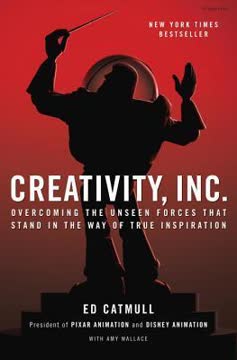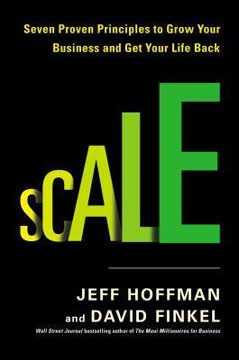Key Takeaways
1. Build a Business, Not a Job: Create Systems for Sustainable Growth
The more you do, the more you have to keep doing. The more you get your business to do, the more time you have to grow and build your business.
Escape the self-employment trap. Many business owners get caught working in their business rather than on it. To scale successfully, you must transition from being the primary producer to creating systems that allow the business to function without your constant involvement.
Create expert systems. Develop processes that capture the expertise required to perform core business functions. This allows you to replicate high-level skills across your organization, reducing reliance on key individuals and enabling scalable growth.
- Benefits of expert systems:
- Reduce dependency on key employees
- Lower costs by pushing tasks to appropriate skill levels
- Increase consistency and quality of output
- Enable faster onboarding and training of new staff
2. Leverage Systems, Team, and Controls to Scale Your Company
Your ability to scale is directly proportional to your company's ability to create cookie-cutter processes for mission-critical areas.
Systems are the backbone of scalability. Develop reliable processes and procedures that enable your business to consistently produce excellent results. This includes checklists, templates, and automated workflows that increase efficiency and reduce errors.
Build a strong team. Attract and retain talented individuals who can help drive growth. Focus on creating a workplace culture that empowers employees and aligns with your company's values.
Implement controls. Establish safeguards and monitoring mechanisms to protect your company from poor decisions or actions. This includes:
- Financial controls (e.g., dual-approval for large expenses)
- Operational controls (e.g., quality assurance checks)
- Performance metrics and key performance indicators (KPIs)
3. Understand Your Customers and Position Your Business Strategically
Why do my customers really come to me? What do they worry about when they wake up in the morning?
Identify your target market. Develop a clear profile of your ideal customer, including demographics, psychographics, and buying behaviors. This allows you to tailor your offerings and marketing efforts more effectively.
Uncover deep customer needs. Look beyond surface-level wants to understand the underlying motivations and pain points driving customer behavior. This insight can reveal opportunities for innovation and differentiation.
Position your business strategically. Use the "Parking Space Theory" to find your unique place in the market:
- Identify your company's biggest strengths
- Determine what your market values most
- Find an open "space" not occupied by competitors
- Choose a single, clear positioning that leverages these factors
4. Develop a Strategic Plan and Execute with Quarterly Action Plans
Your strategic plan is not a place for fixed answers, but rather it is a trusted process comprising provocative questions you systematically ask yourself as you iterate your way to success.
Create a living strategic plan. Instead of a static document, develop an iterative process for regularly reviewing and adjusting your strategy. This allows you to adapt to changing market conditions and seize new opportunities.
Implement quarterly planning. Break down your long-term vision into 90-day action plans:
- Choose 3 focus areas for the quarter
- Define clear success criteria for each focus area
- Outline specific action steps and milestones
- Assign ownership and deadlines for each task
Balance change and momentum. Find the right mix between pursuing new initiatives and optimizing existing successful strategies. This helps you innovate while maintaining stability and growth.
5. Stay Relevant by Reading Market Trends and Innovating
Build a culture and environment where really talented people want to work, and then go get their dry cleaning!
Continuously scan the environment. Regularly expose yourself to new ideas and trends, both within and outside your industry. This helps you spot potential opportunities and threats before they become obvious.
Foster a culture of innovation. Encourage your team to question assumptions and propose new ideas. Create structured processes for capturing and evaluating innovative concepts.
- Innovation techniques:
- Hold regular brainstorming sessions
- Allocate resources for experimental projects
- Reward and celebrate creative thinking
Reimagine your business. Periodically step back and ask, "If we were starting from scratch today, what would we build?" This exercise can reveal opportunities for transformative change and help you stay ahead of disruptive competitors.
6. Remove Obstacles to Growth in Each Business Pillar
Obstacles are a blessing. They give you sturdy stepping-stones to cross the gap from where you are to where you want to go.
Identify and address bottlenecks. Regularly assess each pillar of your business (Sales/Marketing, Operations, Finance, Team, and Executive Leadership) to find constraints limiting growth. Systematically work to remove these obstacles.
Optimize your sales and marketing. Develop scalable lead generation and conversion systems. Focus on:
- Creating a clear value proposition
- Building a repeatable sales process
- Implementing effective follow-up systems
- Leveraging technology for automation and tracking
Streamline operations. Continuously improve your ability to deliver products or services efficiently:
- Document and optimize core processes
- Implement quality control measures
- Leverage technology to increase capacity
- Build relationships with reliable suppliers and partners
Strengthen financial management. Implement robust financial controls and reporting systems. Focus on:
- Accurate and timely financial statements
- Cash flow management
- Profitability analysis by product/service line
- Budgeting and forecasting
7. Master Your Time to Scale Your Company Without Sacrificing Your Life
Working harder isn't the answer; it's often a big part of the problem.
Prioritize high-value activities. Use the Time Value Matrix to identify your most impactful tasks:
- A Time: Top 1% of activities (50% of results)
- B Time: Next 4% of activities (64% of results)
- C Time: Next 15% of activities (80% of results)
- D Time: Remaining 80% of activities (20% of results)
Structure your week for maximum impact. Implement "Focus Days" and "Push Days" to balance high-leverage work with day-to-day operations:
- Focus Days: Dedicate to A and B level activities
- Push Days: Handle routine tasks and move projects forward
Eliminate, delegate, or systematize low-value work. Create a "Stop Doing" list to identify tasks that can be:
- Deleted: Unnecessary activities
- Delegated: Assigned to team members or outsourced
- Deferred: Postponed to a more appropriate time
- Designed out: Eliminated through process improvements
By mastering these principles, you can create a scalable business that grows without sacrificing your quality of life or becoming trapped in day-to-day operations.
Last updated:
FAQ
1. What is Scale: Seven Proven Principles to Grow Your Business and Get Your Life Back by Jeff Hoffman and David Finkel about?
- Comprehensive growth roadmap: The book provides a step-by-step guide for business owners to scale their companies while regaining personal freedom and reducing owner dependency.
- Seven core principles: It introduces seven proven principles covering systems, teams, customer understanding, strategic planning, innovation, overcoming obstacles, and time mastery.
- Focus on sustainable success: The authors blend practical tools with mindset shifts, aiming to help owners build businesses that operate independently and allow for a balanced life.
2. Why should I read Scale by Jeff Hoffman and David Finkel?
- Escape the self-employment trap: The book addresses how owners can stop being bottlenecks and build businesses that don’t rely solely on their constant involvement.
- Actionable frameworks and tools: Readers gain access to practical systems like the Ultimate Business System (UBS), Sweet Spot Analysis, and more for immediate application.
- Balanced growth and life: Real-world examples show how to grow revenue while reducing working hours, helping owners reclaim time for personal pursuits.
3. What are the seven proven principles in Scale and why are they important?
- Principle 1: Build a business, not a job—reduce owner reliance for true scalability.
- Principle 2: Build on systems, team, and controls—create a stable, scalable foundation.
- Principle 3: Understand why customers do business with you—focus on customer needs and effective positioning.
- Principle 4: Create and execute the right strategic plan—use focused, rolling quarterly action plans.
- Principle 5: Learn to read the world—innovate and adapt to market changes.
- Principle 6: Remove predictable obstacles pillar by pillar—address challenges in all business areas.
- Principle 7: You do have the time—master time management to focus on high-value activities.
4. What is the "Level Three Road Map" in Scale and how does it guide business growth?
- Three business stages: The roadmap outlines progression from Level One (start-up), to Level Two (owner-reliant), to Level Three (scalable, systems-driven business).
- Owner dependency reduction: It emphasizes transitioning from a business that depends on the owner to one that operates independently through systems and leadership.
- Exit strategy and freedom: Level Three businesses allow owners to sell, scale further, or own passively, aligning growth with personal freedom and long-term value.
5. How does Scale by Jeff Hoffman define and differentiate "systems" and "controls" for business scalability?
- Systems: Reliable, documented processes and procedures that ensure consistent, efficient results and capture company know-how.
- Controls: Specialized systems designed to protect the business, such as dashboards, procedural checks, and automated safeguards.
- Difference from micromanagement: The book distinguishes between "controls" (empowering, process-driven) and "control" (fear-based owner micromanagement).
- Continuous improvement: Both systems and controls must evolve as the business grows to handle increased complexity.
6. What is the "Self-Employment Trap" in Scale and how can business owners escape it?
- Definition: The trap occurs when a business is entirely dependent on the owner's daily involvement and personal production.
- Negative consequences: This leads to long hours, limited growth, and no personal freedom, as the owner becomes the bottleneck.
- Escape strategy: Owners must build systems, teams, and controls to reduce reliance on themselves, enabling the business to operate independently.
- Work less, grow more: Paradoxically, by doing less personally and empowering the business, owners can achieve faster, sustainable growth.
7. How does Scale recommend understanding your customers to drive business growth?
- Clarify your target market: Identify and focus on your best prospects rather than a broad, unfocused market.
- Discover true customer needs: Understand the deeper reasons customers buy—what problems you solve or desires you fulfill.
- Use Marketing Markers: Develop key qualifying criteria to identify high-propensity buyers and focus sales efforts.
- Competitive positioning: Combine customer insight with competitor analysis to create a compelling brand and unique market position.
8. What is the "Parking Space Theory of Positioning" in Scale and how does it impact branding?
- Parking space analogy: Positioning is like claiming an open parking space—find a market niche that leverages your strengths and isn’t already owned by competitors.
- Focus on one thing: Own a single, clear position in the market rather than diluting your message.
- Strategic questions: Identify your strengths, what your market values, and which spaces are open to claim.
- Branding connection: Your chosen "parking space" shapes your brand, which is reinforced by consistent customer experiences.
9. How does Scale by Jeff Hoffman recommend creating and executing the right strategic plan for business growth?
- Iterative, quarterly planning: Strategic planning is a recurring process of asking questions, testing assumptions, and adjusting based on feedback.
- Balance innovation and momentum: The plan balances the need for change with building on proven successes.
- One-page action plans: Use focused, rolling 90-day plans with top priorities, clear success criteria, and assigned responsibilities.
- Analytical tools: Employ tools like S-O-O-T and Sweet Spot Analysis to identify strengths, obstacles, and high-leverage tactics.
10. What are Expert Systems and the Ultimate Business System (UBS) in Scale, and how do they support operations?
- Expert Systems: Formalize core business functions into replicable processes with tools, training, and controls, reducing reliance on key employees.
- Six-step formula: Define deliverables, map processes, assign expertise levels, control for consistency, refine components, and reevaluate quarterly.
- Ultimate Business System (UBS): A master system that organizes, stores, and refines all company systems in a searchable, accessible, and editable way.
- Implementation: Build an intuitive folder hierarchy, prioritize system development, use technology for accessibility, and embed UBS use in company culture.
11. What are the key financial management and team-building lessons in Scale by Jeff Hoffman?
- Cash flow commandments: Collect what you’re owed, collect faster, maintain accurate financials, stabilize income/expenses, manage costs, improve margins, and make smart purchasing/pricing decisions.
- Funding growth: Leverage customers, vendors, lenders, internal reinvestment, and investors strategically to fund expansion.
- Fraud prevention: Implement financial controls like dual-party money handling and audit trails to protect against theft.
- Team-building: Hire selectively, manage individuals based on preferences, affirm and challenge your team, and remove poor performers quickly.
12. How does Scale by Jeff Hoffman advise mastering time to scale your business and regain your life?
- Time Value Matrix: Identify and focus on A (highest value) and B (sweet spot) activities, while delegating or eliminating D (low-value) tasks.
- Four Ds for D time: Delete, delegate, defer, or design out recurring low-value activities to free up significant weekly hours.
- Structured workweek: Use Focus Days for deep work, Push Days for operations, schedule Prime Time blocks, and complete top tasks early.
- Leverage assistants and email best practices: Delegate routine tasks to assistants and use email efficiently to reduce distractions and increase productivity.
Review Summary
Scale receives mostly positive reviews, praised for its practical advice on growing businesses without relying on the owner. Readers appreciate its comprehensive coverage of topics like process development, strategic planning, and team management. Many find it valuable for new business owners and those seeking to scale their operations. Some critics note that experienced readers may find familiar concepts, while others consider it too advanced for small businesses. Overall, the book is commended for its actionable insights and tools for building self-sustaining companies.
Similar Books










Download PDF
Download EPUB
.epub digital book format is ideal for reading ebooks on phones, tablets, and e-readers.





